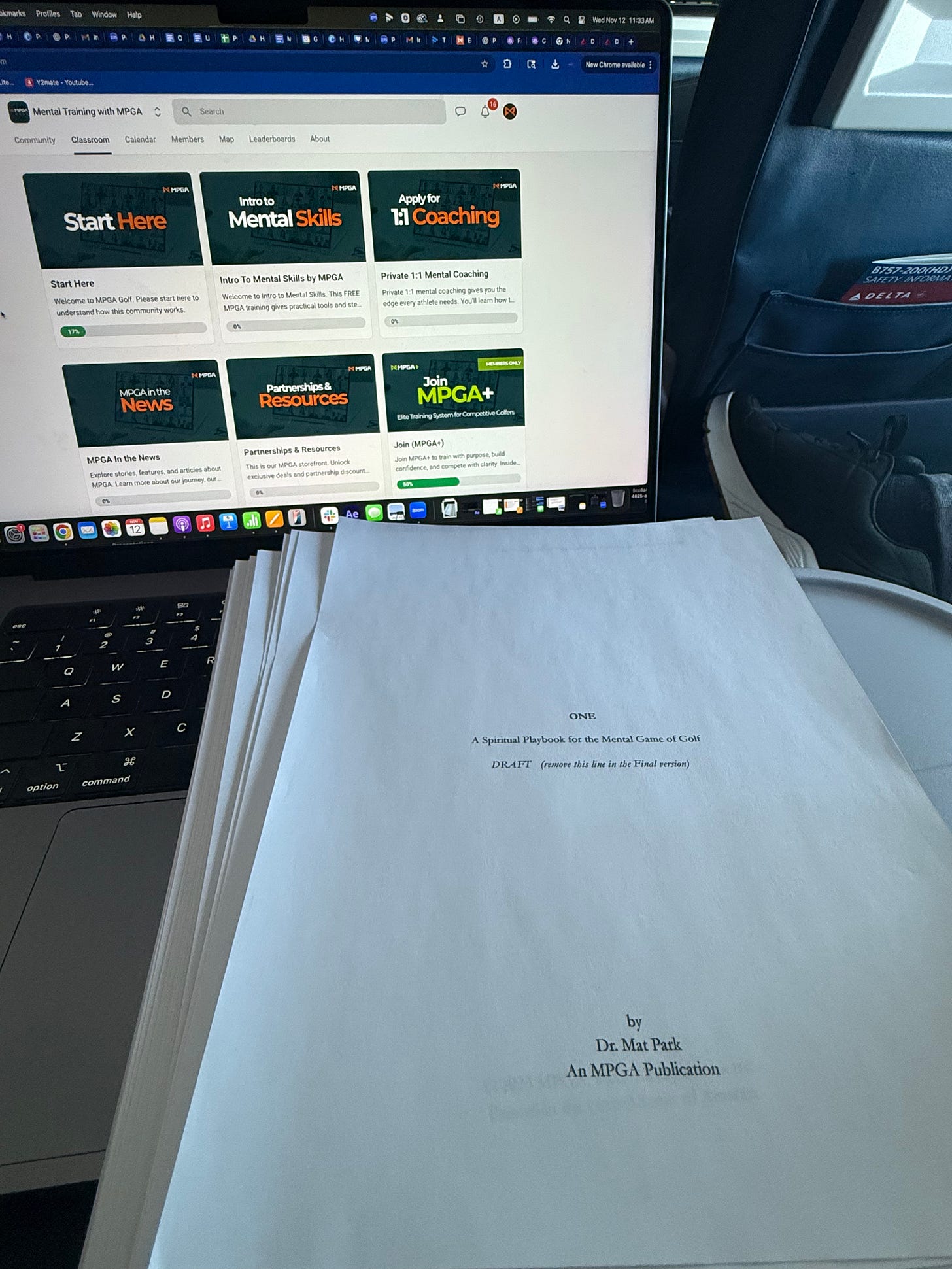This week, our MPGA team is traveling to The ANNIKA driven by Gainbridge, one of the last LPGA Tour events of the season.
It’s not just another tournament stop…It’s a classroom for the mind. There’s no better mirror for how mindset meets performance than watching the world’s best compete under pressure.
When you walk the range at a tour event, you notice two things right away:
Everyone’s swing looks world-class.
However, only a few truly carry peace in their posture.
That’s the difference we’re going to study this week, what research calls psychological flexibility: the ability to stay calm, focused, and values-driven when conditions change. It’s one of the most reliable predictors of performance consistency across elite sports.
The Science of Stillness
Decades of data back this up. Studies on attentional control (Nideffer, 1976; Moran, 2016) show that the best athletes don’t focus harder: they focus smarter. They regulate attention through awareness, not through brute force.
Other research on heart rate variability (HRV) and mindfulness-based performance enhancement (Baltzell & Akhtar, 2014) reveals that steady breathing and presence training improve decision-making under stress.
The best learn how to slow the game down.
That’s why, inside MPGA, we train our athletes to own the moment and to create a deliberate reset between shots. A slow breath, a clear cue, and a focused intention. This single practice lowers cognitive interference and increases the likelihood of flow state, the mental zone where skill and confidence meet without overthinking.
The Mind Behind the Mechanics
The ANNIKA will give our players a live case study in what psychologists call self-determination theory, the idea that true motivation comes from autonomy, mastery, and purpose (Deci & Ryan, 2000).
When you watch an LPGA player walk off a bogey and still smile, you’re seeing autonomy in action… ownership of emotion and process.
When you see one grind on the range after dark, that’s mastery.
And when you see another take time with fans or pray before a shot, that’s purpose.
Each of these reflects the O.N.E. mindset:
Own the Moment – regulate focus through acceptance, not avoidance.
Nothing to Prove – perform from identity, not insecurity.
Execute for the Audience of One – play for purpose, not applause.
When Faith Meets Flow
The connection between spiritual grounding and peak performance isn’t abstract.
Research on intrinsic spiritual motivation (Watson & Nesti, 2005) shows that athletes with faith-based purpose demonstrate greater resilience, emotional regulation, and long-term wellbeing.
That’s why the approach I have been taking in my work with athletes often blends psychology with faith, since both point to the same truth:
Confidence isn’t the absence of fear; it’s the presence of trust.
When athletes understand that their worth is already secure, pressure stops being a threat and becomes what I call praise under pressure: a chance to express, not impress.
Learning from the LPGA
This week, we’ll walk the fairways and take notes. We’ll study routines. Watch body language after misses. Listen for the sound of breath between shots.
We’ll observe how champions manage tempo, attention, and emotional energy from the first tee to the 18th green.
We’re not there to imitate… we’re there to understand.
Every moment will give our players and coaches insight into how elite performance looks when it’s grounded in peace.
As I told our team before we left:
“You can’t control the outcome, but you can OWN what’s right in front of you. And when you do, good things will happen.”
That’s what my upcoming book ONE: A Spiritual Playbook for The Mental Game of Golf is all about, bringing science and spirit together to help golfers perform freely and live fully.
When we return from this trip, we’ll bring back notes, reflections, and stories to share with the MPGA+ community: real-world examples of what freedom under pressure truly looks like.
Because in the end, my journey in studying greatness will never stop. Every event, every conversation, every round deepens my desire to help others live and compete with presence, gratitude, and grounded purpose — to remember that the highest form of performance is honoring something greater than ourselves.
Your Mental Coach,
Dr. Mat





It's interesting how you describe the flow state almost like an optimal computation, making me think about how much a deliberate reset can defrag our mental processes.